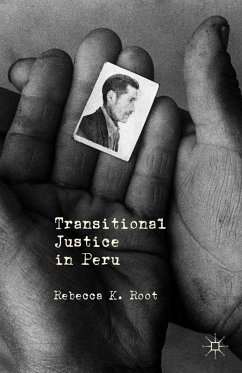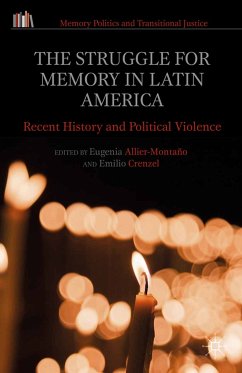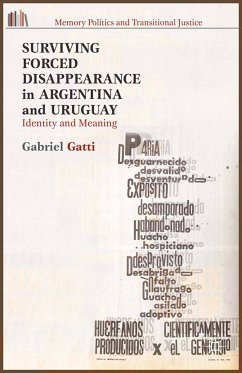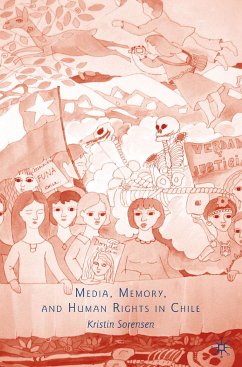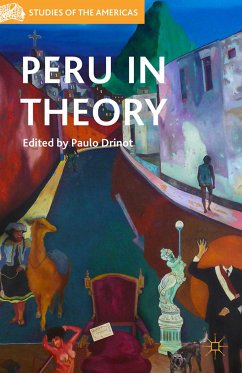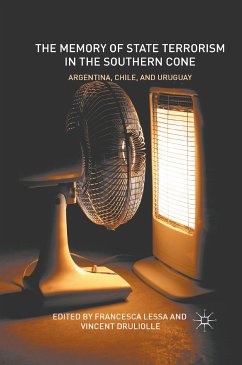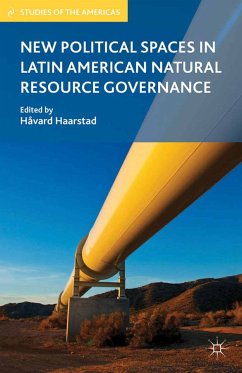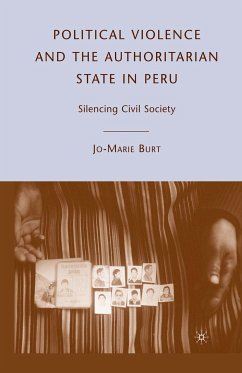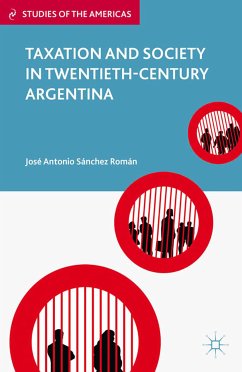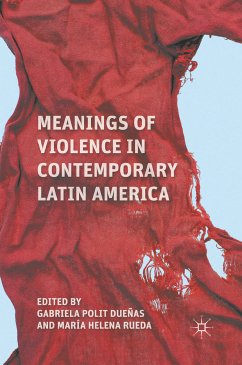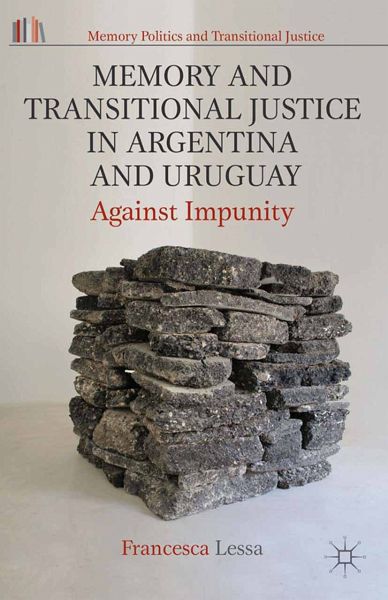
Francesca Lessa
eBook, PDF
Memory and Transitional Justice in Argentina and Uruguay (eBook, PDF)
Against Impunity

PAYBACK Punkte
20 °P sammeln!






This interdisciplinary study explores the interaction between memory and transitional justice in post-dictatorship Argentina and Uruguay and develops a theoretical framework for bringing these two fields of study together through the concept of critical junctures.
Dieser Download kann aus rechtlichen Gründen nur mit Rechnungsadresse in A, B, BG, CY, CZ, D, DK, EW, E, FIN, F, GR, HR, H, IRL, I, LT, L, LR, M, NL, PL, P, R, S, SLO, SK ausgeliefert werden.
Francesca Lessa is a junior research fellow at the University of Oxford.
Produktdetails
- Verlag: Palgrave Macmillan US
- Seitenzahl: 319
- Erscheinungstermin: 11. April 2013
- Englisch
- ISBN-13: 9781137269393
- Artikelnr.: 39295129
'Francesca Lessa's book makes a novel contribution to transitional justice. Lessa blends nuanced analysis of political memory of the authoritarian past with an in-depth study of decisions regarding the full range of institutional mechanisms (i.e., truth commissions, trials, amnesty, reparations) used to deal with that past. Her work emphasizes the critical junctures that shape and shift memory narratives and transitional justice mechanisms. Lessa thus examines a dynamic and evolving process in Argentina and Uruguay, introducing a new methodological approach to dealing with past state violence. Her rich qualitative research in the two countries is informative, profound, and compelling to read." - Leigh A. Payne, University of Oxford, UK 'In
Mehr anzeigen
this timely and interdisciplinary new book, Francesca Lessa provides not only an account of how Argentina and Uruguay have dealt with their traumatic pasts but also a window on how social actors make meanings of the transitional justice process. Integrating secondary sources, documents, and interviews, as well as field notes, this book will be of interest to a wide readership, including students of Latin American studies, international relations, memory studies, and international law' - Mariana Achugar, Carnegie Mellon University, USA 'Forty years ago gross and systematic human rights violations were committed in Argentina and Uruguay. Francesca Lessa offers a thorough and in-depth analysis of the struggles that have been waged in both countries since the end of the military dictatorships to deal with and make sense of these experiences of extreme violence. Her work sheds light on the complex political, legal, and ethical issues involved and provides insight into the changing relations between democracy, justice, and memory on both sides of the Río de la Plata.' - Emilio Crenzel, Universidad de Buenos Aires, Argentina
Schließen
"Lessa provides a valuable contribution to the transitional justice literature by insisting on the importance of memory narratives in historical processes. She presents a useful starting point for future analysis of other transitional justice cases, in the southern cone and beyond. The book will be of considerable use to transitional justice scholars, human rights practitioners and others interested in the dynamics between memory and policy in post conflict and transitioned regimes." (Jessica Mecellem, Democratization, Vol. 23 (2), July, 2015)
'Francesca Lessa's book makes a novel contribution to transitional justice. Lessa blends nuanced analysis of political memory of the authoritarian past with an in-depth study of decisions
'Francesca Lessa's book makes a novel contribution to transitional justice. Lessa blends nuanced analysis of political memory of the authoritarian past with an in-depth study of decisions
Mehr anzeigen
regarding the full range of institutional mechanisms (i.e., truth commissions, trials, amnesty, reparations) used to deal with that past. Her work emphasizes the critical junctures that shape and shift memory narratives and transitional justice mechanisms. Lessa thus examines a dynamic and evolving process in Argentina and Uruguay, introducing a new methodological approach to dealing with past state violence. Her rich qualitative research in the two countries is informative, profound, and compelling to read." - Leigh A. Payne, University of Oxford, UK
'In this timely and interdisciplinary new book, Francesca Lessa provides not only an account of how Argentina and Uruguay have dealt with their traumatic pasts but also a window on how social actors make meanings of the transitional justice process. Integrating secondary sources, documents, and interviews, as well as field notes, this book will be of interest to a wide readership, including students of Latin American studies, international relations, memory studies, and international law' - Mariana Achugar, Carnegie Mellon University, USA
'Forty years ago gross and systematic human rights violations were committed in Argentina and Uruguay. Francesca Lessa offers a thorough and in-depth analysis of the struggles that have been waged in both countries since the end of the military dictatorships to deal with and make sense of these experiences of extreme violence. Her work sheds light on the complex political, legal, and ethical issues involved and provides insight into the changing relations between democracy, justice, and memory on both sides of the Río de la Plata.' - Emilio Crenzel, Universidad de Buenos Aires, Argentina
'In this timely and interdisciplinary new book, Francesca Lessa provides not only an account of how Argentina and Uruguay have dealt with their traumatic pasts but also a window on how social actors make meanings of the transitional justice process. Integrating secondary sources, documents, and interviews, as well as field notes, this book will be of interest to a wide readership, including students of Latin American studies, international relations, memory studies, and international law' - Mariana Achugar, Carnegie Mellon University, USA
'Forty years ago gross and systematic human rights violations were committed in Argentina and Uruguay. Francesca Lessa offers a thorough and in-depth analysis of the struggles that have been waged in both countries since the end of the military dictatorships to deal with and make sense of these experiences of extreme violence. Her work sheds light on the complex political, legal, and ethical issues involved and provides insight into the changing relations between democracy, justice, and memory on both sides of the Río de la Plata.' - Emilio Crenzel, Universidad de Buenos Aires, Argentina
Schließen
Für dieses Produkt wurde noch keine Bewertung abgegeben. Wir würden uns sehr freuen, wenn du die erste Bewertung schreibst!
Eine Bewertung schreiben
Eine Bewertung schreiben
Andere Kunden interessierten sich für


